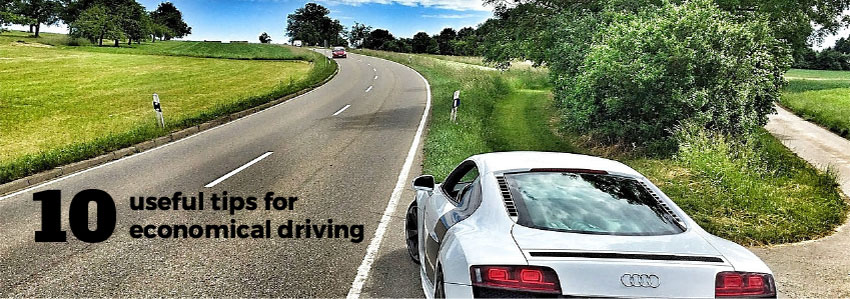10 useful tips for economical driving
 10 useful tips for economical driving
10 useful tips for economical driving
Driving can be a real pleasure, especially when your car is impeccably maintained and the traffic is light. Otherwise, the driving experience can turn into a nightmare both for the car and for the driver.
Poor maintenance of the car, lack of attention to the interval between oil or antifreeze changes, ignoring small defects and chaotic driving are just some of the things that can determine the quality of your experience on the routes you travel on a daily basis.
Moreover, an aggressive driving style and a low attention to details are factors that contribute to the increase of fuel consumption. More often than not, this increase is unjustified and can be easily avoided simply by mastering a few economical driving practices.
See below 10 tricks that can teach you how to drive economically, whether you own a car with a gasoline or a diesel engine:
1. Pay particular attention to the interval between regular checks
The entire mechanism of the car must operate flawlessly in order to drive safely and to ensure that it does not consume more fuel than necessary.
For example, when the heating and cooling system does not function properly, the car consumes more fuel. Also, when the brakes do not work as they should, your effort as well as your car's effort will increase considerably and so will the fuel consumption.
Make a habit out of regular visits to the repair shop for maintenance and inspections.
2. Go in for an oil change on time
Otherwise, there is a risk that the oil viscosity will decrease very much, making the engine and the entire mechanism wear out more quickly. When the engine is not working properly and when it is not lubricated enough, it consumes considerably more fuel.
Refer to the technical manual of the car before getting an oil change and purchase a type of oil that meets all its requirements. Also, remember that a cheaper engine oil does not necessarily translate to fuel economy.
3. Check tire pressure
This habit can help you save money when it comes to fuel consumption. You should take into account the fact that when the car tires do not have enough pressure, their rolling resistance increases and the engine needs more fuel.
4. Remove unnecessary weight from the car
When the car's weight is higher, the engine consumes more fuel. Make sure the trunk is not full of unnecessary tools or luggage that can be left at home. You can also remove the external trunk when you do not need it.
5. Plan your route in advance
A significant amount of fuel is consumed chaotically by drivers who get lost while driving. If you want to save fuel, plan your route before taking the road and use a GPS system. By doing this, you will always find the shortest route to your destination.
6. Brake gradually
When braking abruptly, the car burns a much larger amount of fuel than when you are slowing down gradually. A calm and preventive driving style will help you save fuel and, at the same time, reach your destination safely.
7. Change gears earlier
For an optimum fuel consumption, it is recommended to change gears between 2000 and 2500 revolutions. Therefore, there is no need to rev the engine very hard to get into a higher gear. An earlier gear change will help you save more fuel than you may think.
8. Reduce the use of air conditioning
Although during hot summer days it is almost impossible to drive comfortably due to high temperatures, there are times when you do not need air conditioning. When possible, turn off the cooling system to protect your health and to save the money spent on fuel.
9. Attention to the driving speed
Although we have been taught that higher speeds favor the reduction of fuel consumption, this does not apply to very high speeds. The more you accelerate, the more fuel will be burned by the engine, which is why it is recommended to comply with the legal speed limits.
10. Use lubricants with fuel-saving potential
The market offers a wide variety of lubricants that can help you protect your car's engine. When choosing a lubricant it is best to stick to a high-quality product, but also to consider new technologies that can help save fuel and protect your car.
If you want to save as much fuel as possible when driving your car, it is important to keep in mind the above 10 rules.
In addition, for more ideas that can help you reduce fuel consumption, click here to see how 2 out of 3 consumers have managed to get fuel economy by using Mobil 1 oils.







